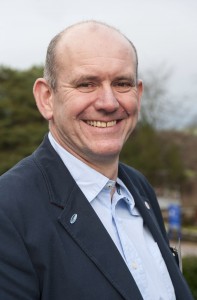My name is Mat Roberts and I’m Head of Sustainability at Landmarc Support Services (Landmarc). This makes me responsible for energy, waste, water, environmental management, sustainable procurement, training, protected species and landscape management across the MOD’s Defence training estate. I’ve also recently been made a Director of Cynnal Cymru – Sustain Wales, a topic that’s very close to my heart and what we’re working closely with DIO to achieve.

Since the launch of the Public Services (Social Value) Act, I’ve also been heavily involved in helping DIO to consider how bought-in services can be used to improve environmental, economic and social well-being within our local communities.
The Training Estate and Local Communities
The training estate covers some of the most rural locations in Britain and as such, we rely heavily on the goodwill of the communities in which we work. So it makes sense to ensure that we’re working alongside them and helping them at the same time as going ahead with our day-to-day operations. I’ve spent most of my life living and working in the sort of rural locations that the MoD has around its training estate. As such, I have a very personal connection to the value that large organisations have in these locations. Before joining Landmarc I worked in the National Parks and AONB (Areas of Outstanding Natural Beauty) community and have a real passion for the type of high quality land stewardship that is at the heart of DIO’s approach.
Social Value
The Public Services (Social Value) Act has been live for just over 12 months. It’s making public bodies think hard about the ‘social value’ of services they buy and commission. For the training estate in particular, it’s provoking a lot of thought about how Defence activities can bring benefits to each local community.
We’re working hard to establish what applying the right environmental, economic and social principles can bring to the estate for the long term. It’s about us getting the best value across all three pillars of sustainability. I work with both staff and suppliers to achieve innovation and ensure that we protect the landscape in which we work and live.
I’m really passionate about this and have seen in the short-term what small changes can mean in terms of big difference. For me it’s about thinking smarter across the estate and not implementing huge changes that people will be wary of but just little things that can be undertaken easily and relatively quickly for maximum benefit.
Recycling and Forestry
For example we’ve recently installed recycling and sorting facilities on eight large sites. This allows us to segregate military waste and improve recycling rates. This, in itself, has helped to contribute to reducing waste to landfill by 70 per cent.
It’s also about thinking smarter, not harder, to make things count. Our forestry activities, such as timber harvesting, now enable us to generate additional profit across the estate to reinvest in other initiatives. This has been a great way for us to create jobs for local contractors, but then we also put our thinking caps on and realised that the wood could be used for fencing around the estate, where we’d previously bought in supplies. Helping to save valuable natural resources and financial cost is a brilliant example of what we’re working hard with DIO to achieve.

But, like I said at the start, we need to work hand-in-hand with the communities that surround the estate. A thriving rural community is essential to both our success and positive community relationships with DIO.
Over the last two years, we’ve set up initiatives that can really make a difference to rural lives. These include our rural enterprise hub that provides an office touch-down facility for entrepreneurs in Wiltshire and our rural innovation investment scheme Landmarc100. Working with local businesses like this means that we can help them to start and grow, while also hopefully retaining local employment and enabling us to use local suppliers.
As always, our first priority is to support our Armed Forces as they prepare for operations, but social value is making us all think smarter and harder to sustain and support the communities that depend on the estate for their livelihood.
Leave a comment